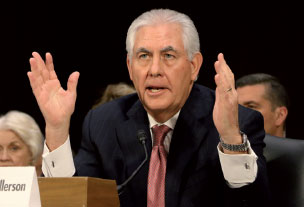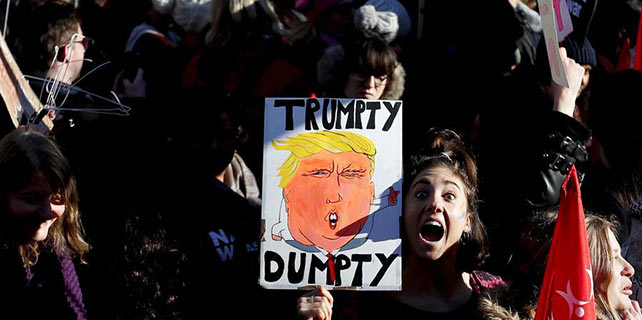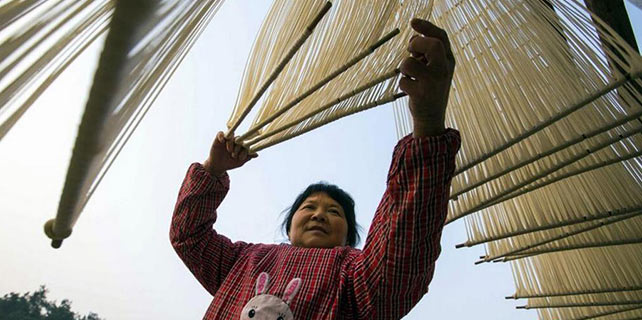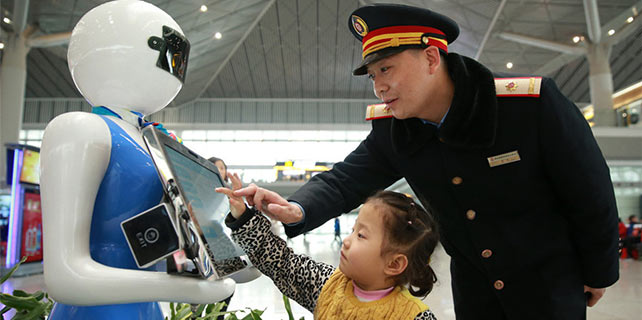Uncertainty clouds China-US ties
|
Rex Tillerson testifies before the Senate Foreign Relations Committee on his nomination to be secretary of state. chen weihua / china daily |
One-China policy
Trump's threats are widely seen as a tactic to get better deals with foreign countries. But when he took the phone call from Taiwan leader Tsai on Dec 2 and later tweeted that the One China policy is negotiable, he sparked not only the strongest protest from the Chinese government, but a campaign by the Chinese media, both official and social media.
Sovereignty and territorial integrity, especially regarding Taiwan, touches the sensitive nerve of Chinese who still bitterly remember how China was forced to cede Taiwan to Japan under the humiliating Treaty of Shimonoseki after losing the First Sino-Japanese War in 1895. Taiwan was returned to China in 1945 after the Second World War.
The Taiwan issue is widely known in the world as a core interest and red line for China.
After Trump's challenge to the long-standing One China policy, some former US officials and scholars on Taiwan also criticized Trump's ignorance. Richard Bush, a senior fellow at the Brookings Institute, wrote a long open letter to Trump on Dec 13 on the One China policy.
Rex Tillerson, Trump's nominee for secretary of state and a former CEO of Exxon Mobil, said in his confirmation hearing last week that "I don't know that there is any plan to alter the One China position."
While no US leader in the last 40 years has publicly challenged the One China policy, the Taiwan issue heated up at times, causing a major setback in China-US relations. It happened when the US sold arms to the island. For most Chinese, selling arms to a Chinese island is totally unacceptable.
Relations between the Chinese mainland and Taiwan experienced unprecedented peace and development under the eight years of Taiwan's Kuomintang party leader Ma Ying-jeou from 2008 to 2016. The mainland is by far the largest trade partner for Taiwan, with $71 billion, or more than a quarter of Taiwan's exports, going to the mainland in 2015.
The winning of the 2016 election by the pro-independence Democratic Progressive Party (DPP) has brought uncertainty to the ties since Tsai has refused to acknowledge a 1992 consensus reached by the two sides on One China.
North Korea
During his presidential campaign, Trump said that he would be willing to meet with North Korea leader Kim Jong-un. He also said after a North Korea nuclear test in January 2016 that China has "total control" over North Korea and that if China doesn't "solve the problem, we should make trade very difficult with China".
Trump tweeted early this month that "China has been taking out massive amount of money & wealth from the US in totally one-sided trade, but won't help with North Korea. Nice!"
US officials, including Trump's secretary of State nominee Tillerson and defense secretary nominee James Mattis, have listed North Korea as a major security threat to the US.
Last week's hearings for Tillerson and Mattis came a few days after North Korea announced that it will launch an intercontinental ballistic missile (ICBM) "anytime and anywhere" determined by its supreme headquarters.
"The US is wholly to blame for pushing the DPRK to have developed ICBM as it has desperately resorted to an anachronistic policy hostile toward the DPRK to encroach up its sovereignty and vital rights," DPRK's official KCNA news agency quoted the country's Foreign Ministry spokesman as saying.
In response to Trump's latest tweet, Foreign Ministry spokesman Geng Shuang said "China's efforts are widely recognized, and we hope all sides will avoid remarks and actions to escalate the situation."
US officials, including outgoing Secretary of State John Kerry, have spoken positively of China's efforts in the denuclearization of the Korean Peninsula, including China's latest endorsement of the UN Security Council resolution in late November of imposing new sanctions on DPRK for its nuclear test in September.
Liu Jieyi, China's ambassador to the UN, applauded the resolution. But he said it pointed out that relevant measures are not intended to produce negative consequences on DPRK's humanitarian situation and the livelihood of its people, not to affect its normal economic and trade activities.
China has long urged resumption of the Six-Party Talks suspended since 2008. The talks on denuclearization of the Korean Peninsula involve DPRK, South Korea, China, the US, Japan and Russia.
While endorsing the UN resolution, China has expressed strong protest over the planned US deployment of THAAD (Terminal High Altitude Area Defense) anti-ballistic missile system in South Korea. Both China and Russia regard the system as posing a strategic security threat to their nations.
Charles Armstrong, a professor of history at Columbia University and an expert on the Korean Peninsula, said these are the strongest sanctions imposed so far, but he is not sure if the sanctions alone could make the DPRK cease its nuclear and missile testing.
"A resolution of the problem can only be reached if there are positive inducements for North Korea to give up or suspend its nuclear program, and that would have to involve dialogue with the US," he told China Daily.
"We will have to see what the Trump administration's policy will be toward North Korea," Armstrong said.
Ted Carpenter, a senior fellow of defense and foreign policy at the Cato Institute, said imposing more sanctions simply continues a strategy that hasn't worked.
"China's willingness to go along with tougher sanctions, though, reflects Beijing's growing impatience with North Korea. It will be interesting to see if Trump adjusts Washington's policy on this issue," Carpenter said.
South China Sea
Trump, known for his loose talk, said during the presidential campaign that "we have rebuilt China, and yet they will go in the South China Sea and build a military fortress the likes of which perhaps the world has not seen".
But the real attention on Trump's views on the South China Sea was focused last week when Tillerson described China's land reclamation in the area as "akin to Russia's taking of Crimea".
"We are going to have to send China a clear signal that, first, the island-building stops," he told lawmakers during the hearing. "And second, your access to those islands also is not going to be allowed."
Tillerson's words drew a sharp response from Beijing, with Foreign Ministry spokesman Lu Kang saying that the tension in the South China Sea has cooled down, and China and countries in the region have returned to two-way talks.
On Tuesday, Ben Rhodes, Obama's deputy national security adviser, expressed US concern over the South China Sea, but he said "we've not thought that military confrontation would be the right approach to the South China Sea," a pointed response to Tillerson's suggestion.
China has long regarded the US as biased in its words and deeds regarding the maritime territorial disputes between China and some of its neighbors in a bid to bolster US influence in the region where China is the top trade partner for most economies. The US was believed to be behind the Hague ruling last July on the South China Sea in a case brought about by the Philippines.
However, the new Philippine President Rodrigo Duterte, unlike his predecessor Benigno Aquino III, has chosen to distance his country from the US and has sought closer ties with China.
Just last week, Nguyen Phu Trong, general secretary of the Communist Party of Vietnam (CPV) paid a four-day trip to China where he had "a candid exchange of views" on maritime issues, according to a communique issued. In Beijing, Nguyen met both President Xi, Premier Li Keqiang and other senior Chinese officials.
China's warming relationship with both the Philippines and Vietnam also came at a time when Trump announced its intent to withdraw from the 12-nation Trans-Pacific Partnership (TPP) trade agreement. Trump, and Ross, the secretary of commerce nominee, argued that the US will benefit more from bilateral agreement instead of multilateral agreement.
TPP, signed last February, has long been regarded by the Obama administration as the essence of its rebalance to Asia strategy. Trump's planned cancellation and his anti-trade rhetoric have raised serious doubts in the other 11 partners about the US commitment.
chenweihua@chinadailyusa.com

















